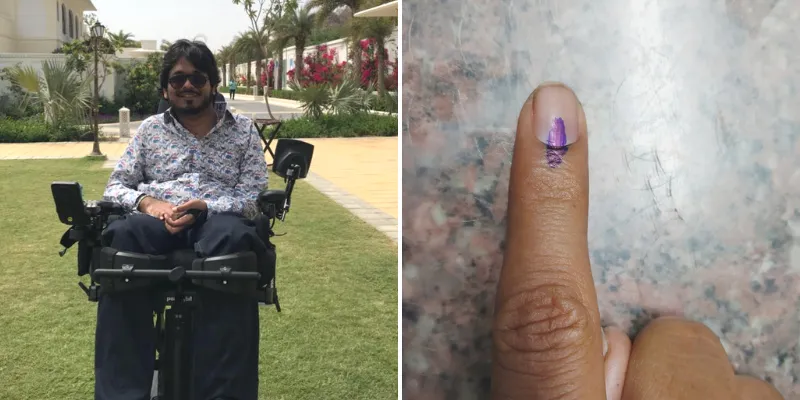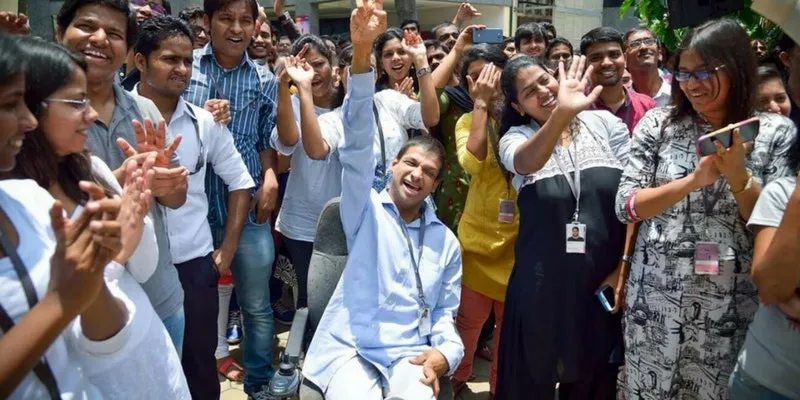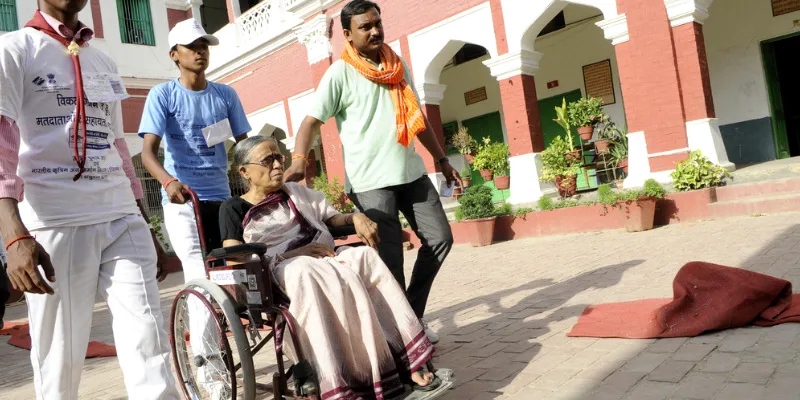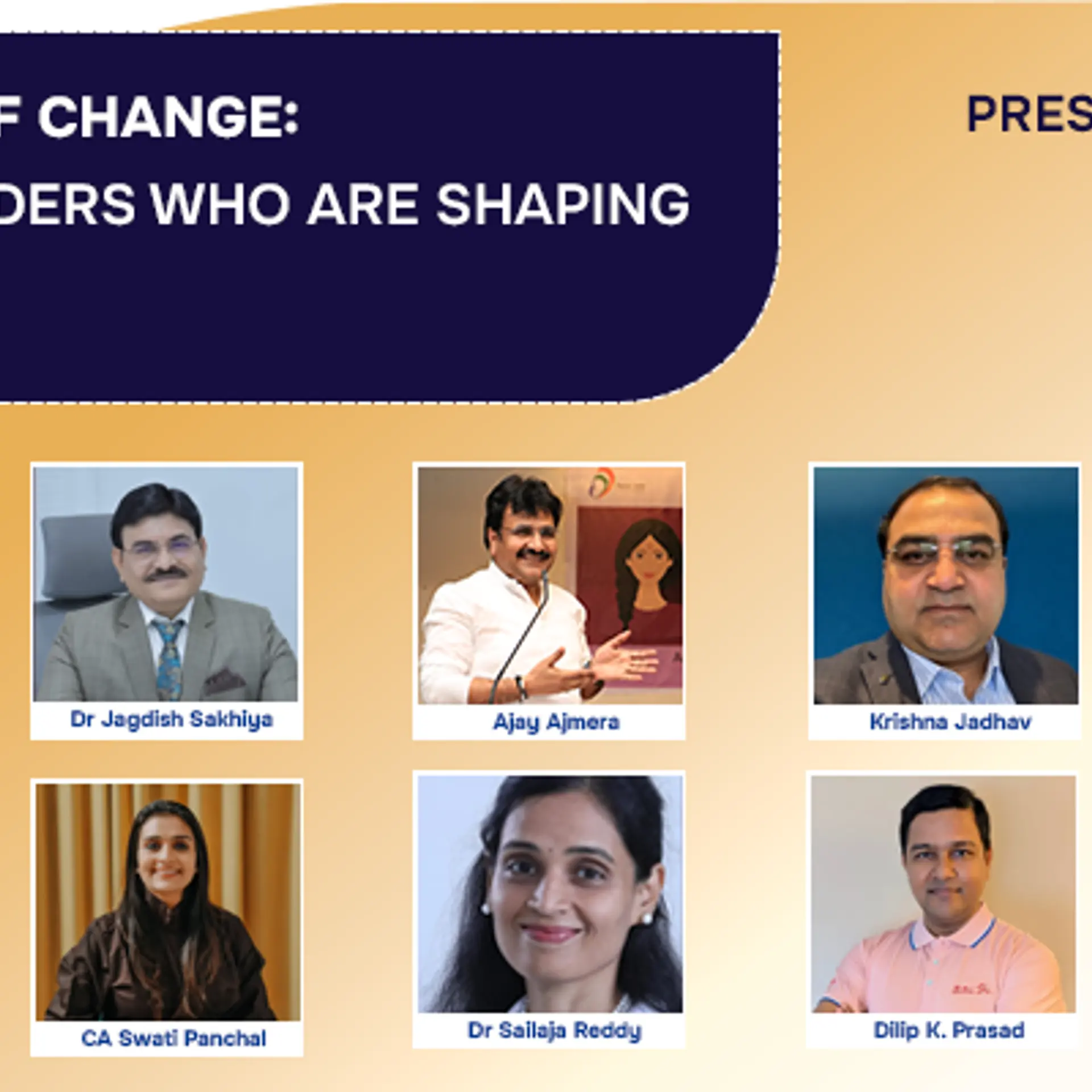From Braille ballots to pick-up and drop facilities, how 2019 Lok Sabha elections are all about inclusion
The Election Commission of India has made special provisions for People with Disabilites, such as Braille ballots, mobile apps for assistance, construction of temporary ramps, pick-up and drop facilities, etc. to help voters turn out in large numbers.

Image Credit: The Election Commission of India
As India votes in the 17th Lok Sabha elections, the Election Commission of India has taken several steps to ensure more people come out and vote.
This time, in a first-of-its-kind initiative by the EC, Army troops deployed along the LoC and Siachen were asked to download ballot papers, vote, and post it to their respective electoral returning officers. Similarly, in a unique experiment, the ECI in BTM layout poll booth in Bangalore South constituency has made a provision for virtual queues to help voters get minute-by-minute update about their polling booth.
And among the many firsts, to make elections more inclusive, the Bangalore South constituency in Bengaluru will witness a poll booth that will be managed by a team that will include People with Disabilities (PwD).
The election commission has also come up with special provisions such as braille ballots, a mobile app for assistance, construction of temporary ramps, pick-up and drop services from cab aggregators such as Uber and Ola Cabs, and training booth-level officers in sign languages to help people with disabilities.
SS Nakul, Additional Commissioner, Bruhat Bengaluru Mahanagara Palike (BBMP), Bengaluru South, says,
“PwDs are generally left out during the elections because of inadequate provisions at the poll booths. Hence, this move was taken to showcase that even PwDs can come here and vote.”

In Jully 2018, the ECI conducted a 'National Consultation on Accessible Elections' with all the 36 Chief Electoral Officers to ensure that the 2019 elections are PwD-friendly.
People with Disabilities form a massive chunk of Indian electorate. The first phase of voting, which concluded on April 11, saw participation from PwDs across states. Over 18,000 PwDs voted from Hyderabad, and 900 voted in Meghalaya.
In Bangalore South constituency alone, there are 1,165 voters who will be assisted by 660 volunteers spread across the polling booths. Further, care has been taken to ensure that toilets and vehicle facilities are accessible for the PwD voters.
Interestingly, during the Karnataka Assembly Elections, the turnout of the differently-abled voters stood at 76 percent.
“PwDs should also get encouraged, motivated, and participate in voting. For us, this is an empowerment process, which goes beyond voting,” says Nakul.
No voter to be left behind
To uphold the spirit of free and fair elections, the Election Commission of India had declared ‘Accessible Elections’ as the theme for this year’s National Voters’ Day, which is held every year on January 25.

In the 2014 Lok Sabha election, Sachin, a quadriplegic, finished voting within 5 minutes of arrival at the polling booth.
In their effort to ensure that no voter is left behind, irrespective of any form of disability, the EC directed officials to identify PwD voters state-wise and facilitate the voter registration forms and procedures for them personally. With “Assured Minimum Facilities” at polling stations, and by collaborating with NGOs and Residential Welfare Associations, it has trained polling officers and volunteers to assist PwDs.
Further, with an aim to make information and registration procedure easier, the ECI also launched the ‘PwD’ app. The Android app is designed specifically for first-time voters or for those who want to avail the facilities on polling day.
Also read: What young India wants from its next Prime Minister
Voters speak
During the 2014 Lok Sabha Elections, the ECI had initiated several measures that made the registration process voter-friendly. This included Braille signage on the ballot unit of EVM, construction of ramps, provision for PwDs to enter polling stations without waiting in the queue, and facility to take wheelchairs inside polling stations.
Despite these elaborate preparations, the voters faced a difficult time.

Prasant hopes that the voting procedure, this time, would be accessible for people on a wheelchair.
Prasant Kamat, a Mindtree employee and part-time shareholder, who has cerebral palsy, had a "horrible voting experience" during the 2014 General Elections.
“Earlier, my votes did not get counted because paper ballots were used, and I needed help to affix the stamp on the ballot paper. I thought the EVM was a perfect solution to all our problems. I couldn’t be more wrong,” the 44-year-old says.
Prasant says, in Bengaluru’s Nagarabhavi polling booth, the EVM machine was placed on a rickety makeshift table, which was “ready to crumble at any moment.” And the EVMs were placed at narrow junctions, which made it difficult to manoeuvre wheelchairs. Further, multiple dangling cables from the EVM machine would “cause even a normal person to trip over.” The EVMs didn’t have Braille markings and the polling officials were inept at handling the situation.
“They were more eager in ensuring the ‘process’ was followed. They told my mother that she could cast the vote on my behalf,” he explains. However, Prasant is hopeful that things will be better managed this year.
Ridhi Jain, a BCom student and a quadriplegic first-time voter from North Delhi, too hopes the facilities at the polling booth will be as good as it sounds.
“There were campaigns happening outside our college, and when I asked about the facilities and provision for people in a wheelchair, the volunteers guaranteed that things will be smooth for people like us. I have even downloaded the PwD app and I look forward to voting for the first time,” the 20-year-old says.
Also read: Election Commission launches app to help citizens be more vigilant during Lok Sabha polls
Hope for inclusion
Arman Ali, Executive Director of National Centre for Promotion of Employment of Disabled People, says while the provisions by the ECI is applaudable, a lot more needs to be done, and that political parties too need to adopt an inclusive attitude.
“In the first phase of elections, we have seen a lot of gaps. Accessibility of polling booth is an urban phenomenon. And besides one political party, there is nothing promising in the manifesto. Disability continues to remain a lip service. We need to move disability from welfare to development agenda,” Ali says.
Sachin Chamaria, a quadriplegic and a two-time voter says,
“Inclusive infrastructure and development agenda is not the benefit of just PwDs. Every individual will grow old someday and face physical limitations. Ramps and accessibility will help every Indian, and these facilities will make our democracy an inclusive democracy.”

Despite pathbreaking legislations, 70 million persons with disabilities in India remain excluded from all rights-based discourses, other human rights movements, and mainstream development agenda.
Irrespective of the political party, Ali hopes the incoming government and society at large would view persons with disabilities through the lens of their ability, and not disability.






